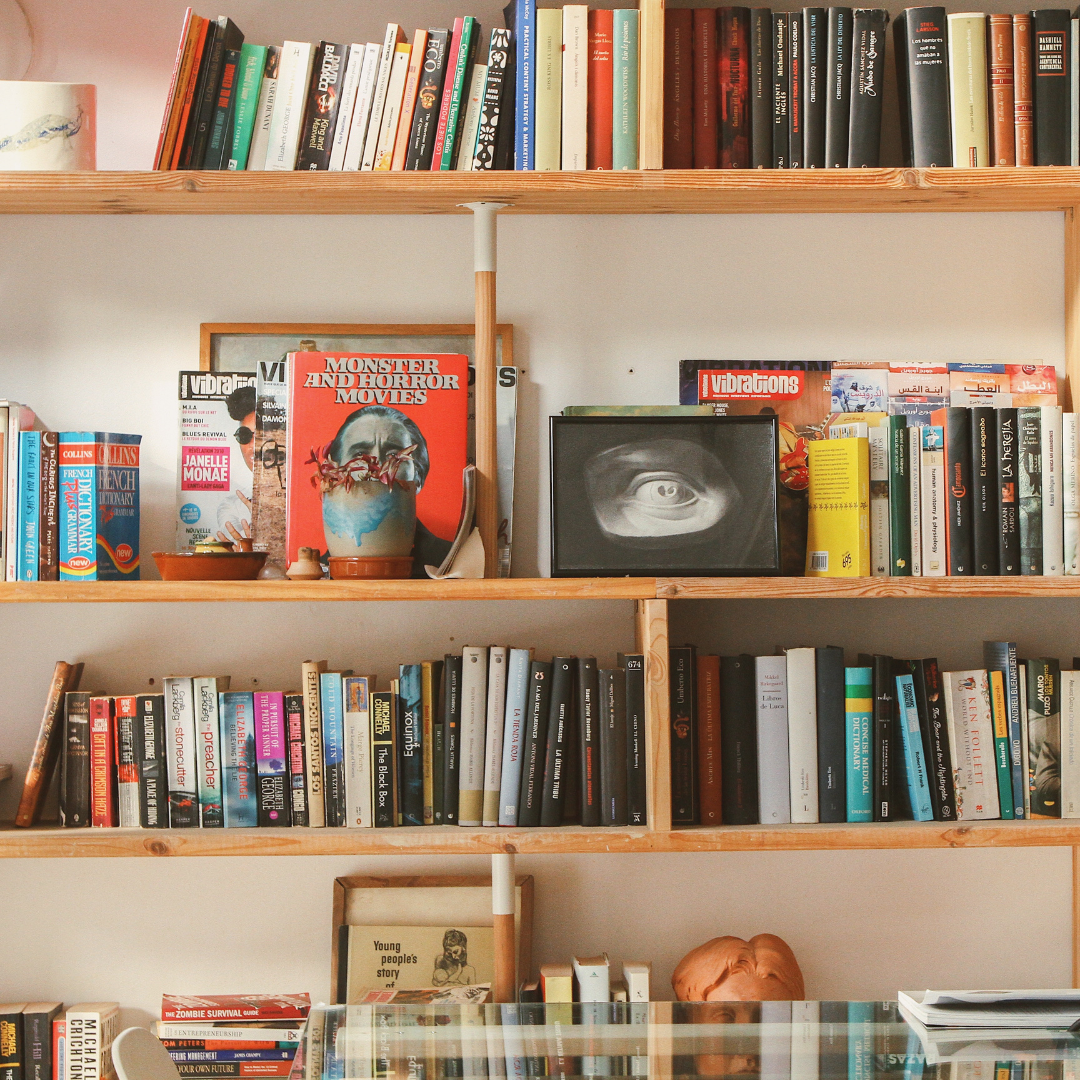Sober Curious? Here are 8 Books That'll Help You Build A Conscious Relationship With Alcohol
FYI: This post includes affiliate links, but I only share things I actually use and love. Thanks for being here and supporting me!
In 2019 I did my first Sober October and, a few months later it stuck for good: I had my last drink on February 16, 2020. It was anticlimactic and unceremonious - a tiny sip of rum with dessert at a friend’s dinner party. I didn’t consciously choose it to be my last drink… it just was. My interest in alcohol was minimal at best and purely social at that point, so, when the world went into lockdown a few weeks later and our collective social lives dried up, so did I.
I attribute my sober curiosity to the accumulation of a few things:
✨ I was becoming more in tune with my body and realizing that I didn’t particularly appreciate how drinking made me feel,
✨ The Sober Curious movement was gaining momentum and becoming more mainstream
✨I was reading books about alcohol, wellness, and mindset that ultimately led me down this path.
These are the books that I found most insightful and interesting while exploring my relationship with alcohol. Whether you’re exploring your relationship with alcohol or not, I hope they inspire you to find your version of “feeling good”.
Sober Curious - I listed this book first because it best describes my relationship with alcohol right now - sober curious. Ruby Warrington perfectly captured my experience of questioning my relationship with alcohol but, at the same time, not really having any large event that spurred it. I suppose my interest in wellness is what got me questioning alcohol in a lot of ways. Does alcohol (something that is truthfully poisonous in our bodies) really fit into finding wellness? Am I truly living my best life if I’m hungover every other weekend?
Sober Curious is a quippy, clever, and often times playful read. I appreciated Warrington’s honesty about her own journey, the example remarks she offered up when people accost you for ordering a soda, and the larger picture she painted of the human experience. This reads more like a novel than an actionable personal-development book but is equally worthy as a resource.
“Sober curiosity is often defined as having the option to choose, to question, or to change your drinking habits for health-focused reasons (mental and/or physical). The sober curious movement has encouraged individuals to recognize the often-unhealthy habits that are associated with alcohol.”
The Desire Map - I love months like #SoberOctober and #DryJanuary because they empowered me to take a beat from drinking culture and ask myself; do I even like this? I realized pretty quickly that the answer was a vehement no. I didn’t like how drinking made me felt, it wasn’t aligning with my goals (it’s hard to train for a marathon when you’re hungover!), and ultimately it wasn’t adding value to my life. The Desire Map is not a book about alcohol or drinking, but I found it incredibly illuminating. It reframes goal-setting to focus on how we want to feel (ex: I want to feel empowered and valued at work) vs. what we want to accomplish (ex: I want a raise). For me, this way of goal-setting is way more motivating. For example, not drinking for a month felt like a fun challenge, but I wasn’t exactly jazzed about it. I was, however, jazzed about exploring my creativity, feeling less anxious, and having more energy.
It Starts with Food - the impact that alcohol has on our physical health isn’t often discussed, and I am a strong believer in knowing what’s going on in your body so that you can make the most informed choices for your situation at any given moment. This book is written by the founders of Whole30, but you don’t have to be planning to do Whole30 anytime soon (or ever!) to get value out of it. Rather than labeling foods as good or bad, It Starts with Food breaks down how different foods interact with your body. This book doesn’t focus solely on alcohol - you will learn a TON about the science of nutrition and exercise, too.
Shop The Post
The Burnout Generation - “Burnout is a state of emotional, physical, and mental exhaustion caused by excessive and prolonged stress. It occurs when you feel overwhelmed, emotionally drained, and unable to meet constant demands.” (HelpGuide). Millennials, in particular, are susceptible to a specific flavor of burnout that comes with transitioning into adulthood during a massive financial recession. This was the first time that I heard my experiences so succinctly repeated back to me and, upon further reflection, it helped me gain clarity on a lot of experiences I previously thought were “random”. This book isn’t about alcohol, per se, but rather the psychology that we all grew up with, and how that might impact our coping mechanisms today. No matter what your relationship with alcohol is, by taking more time to think about burnout, you might then have some lightbulb moments about your coping mechanisms. I definitely did!
The Alcohol Experiment - The Alcohol Experiment by Annie Grace is equal parts 30-day challenge and educational resource, which makes it the perfect book if you’re heading into a month-long challenge. Each day Grace introduces a new factoid about alcohol as it relates to our bodies, brains, and emotions. She also periodically explains why common arguments like I just like the taste of alcohol or this red wine pairs nicely with my meal are actually incorrect. A lot of books about alcohol are packed with doomsday-esque commentary, and I appreciated the pragmatic, fact-focused approach here. It also feels so satisfying to make it all the way to day 30 and read the last few pages!
This Naked Mind - If you loved The Alcohol Experiment you will LOVE This Naked Mind because it’s essentially the same book. I’m not kidding - This Naked Mind is also by Annie Grace and delivers a lot of the same information. However, This Naked Mind is a bit meatier with longer explanations of certain topics and without, of course, the 30-day challenge piece. Even though at this point I’ve done The Alcohol Experiment a few times, I still enjoyed reading This Naked Mind. Grace packs her books with so much information that I had to hear some of it a few times for it to truly digest. No matter which one you read first, I suggest reading both.
Quit Like a Woman - Thanks to Chrissy Teigen, this book finally got the recognition that it deserves this year. This book is, admittedly, pretty impassioned, but I loved Holly Whitaker’s no-BS take on the female relationship with alcohol. Unlike other quit-lit, Quit Like a Woman focuses on society as the problem instead of alcohol or the individual. If you are the kind of person who appreciates tough love (where are my former athletes that miss coaches yelling at them!) this will be a good fit - at times I felt like Whitaker was yelling at me. This could, of course, be partly due to the fact that I listened to the book on audio, but you get what I’m saying. Quit Like a Woman is an unapologetic self-help mixed with autobiography. Each personal example really drove the content home. No matter how you feel about booze, this book makes a lot of well-researched points about the culture surrounding alcohol and women.
The Burnout Workbook - As much as I love an inspirational read, sometimes it’s nice to just have somebody tell you what to do. I stumbled upon The Burnout Workbook recently at Third Place Books and instantly snatched it up. It’s packed with “Advice and Exercises to Help You Unlock the Stress Cycle”, and has ample actionable resources and tools that you can start using immediately. The exercises vary in length and intensity but are generally brief and easy to implement. I love having workbooks like this that I can dig into when I need extra motivation, and they’re a fun way to track your progress over time.
Follow on Instagram
This article is for informational purposes only and is not intended to diagnose, treat, cure, or prevent any disease. If you or somebody know is struggling with alcohol, please seek help. For resources, check out the National Institute on Alcohol Abuse and Alcoholism (NIAAA) resource Treatment for Alcohol Problems: Finding and Getting Help.
This article is not, nor is it intended to be, a substitute for professional medical advice, diagnosis, or treatment and should never be relied upon for specific medical advice.









